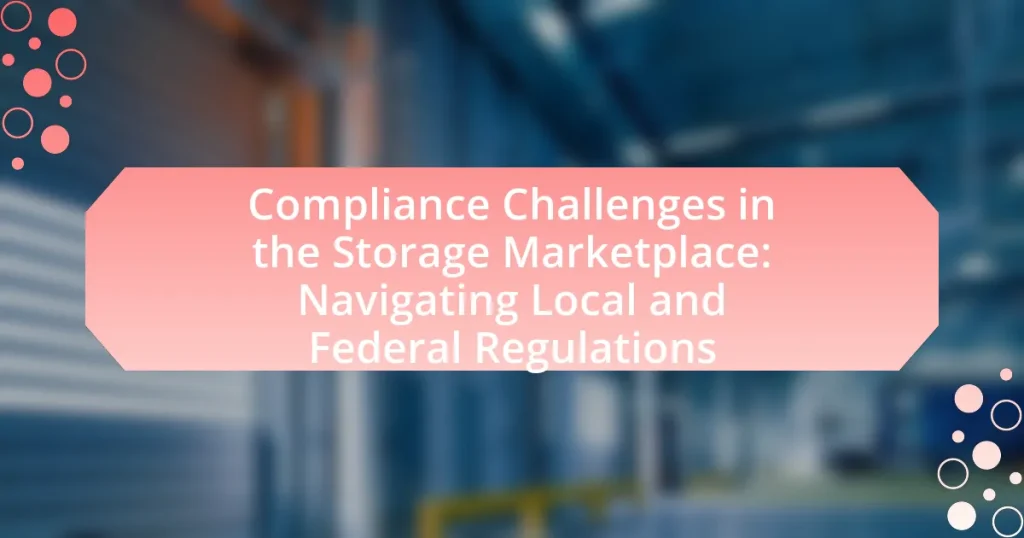The article focuses on the compliance challenges faced by storage facilities in navigating local and federal regulations. It outlines key issues such as adherence to diverse regulations like GDPR and HIPAA, the impact of local laws on operational standards, and the role of federal regulations in ensuring safety and environmental protection. The discussion includes specific local compliance requirements, the consequences of non-compliance, and strategies for effective compliance management, including the use of technology and staff training. Additionally, it highlights emerging trends in regulations and best practices for maintaining ongoing compliance in the storage marketplace.
What are the key compliance challenges in the storage marketplace?

 |
|
The key compliance challenges in the storage marketplace include adhering to diverse local and federal regulations, managing data privacy laws, and ensuring security standards are met. Storage providers must navigate a complex landscape of regulations such as the General Data Protection Regulation (GDPR) in Europe and the Health Insurance Portability and Accountability Act (HIPAA) in the United States, which impose strict requirements on data handling and storage practices. Additionally, the need for regular audits and compliance checks adds to operational burdens, as failure to comply can result in significant fines and legal repercussions.
How do local regulations impact storage facilities?
Local regulations significantly impact storage facilities by dictating operational standards, zoning requirements, and safety protocols. These regulations can determine the types of services offered, such as climate control or hazardous material storage, and influence the facility’s location based on zoning laws that restrict certain types of businesses in residential or commercial areas. For instance, a study by the Self Storage Association indicates that compliance with local building codes and fire safety regulations is essential for facility operation, as non-compliance can lead to fines or closure. Additionally, local regulations may require specific permits for construction or expansion, affecting the facility’s growth and profitability.
What specific local regulations must storage facilities adhere to?
Storage facilities must adhere to zoning regulations, building codes, fire safety standards, and environmental regulations specific to their locality. Zoning regulations dictate where storage facilities can be located and the types of operations permitted, while building codes ensure that the structures meet safety and accessibility standards. Fire safety standards require facilities to implement measures such as fire alarms, extinguishers, and clear evacuation routes. Environmental regulations may include waste disposal protocols and compliance with hazardous materials handling, depending on the types of items stored. These regulations vary by municipality, necessitating that storage facility operators consult local government guidelines to ensure compliance.
How do local compliance challenges vary by region?
Local compliance challenges vary significantly by region due to differences in regulatory frameworks, enforcement practices, and cultural attitudes towards compliance. For instance, regions with stringent environmental regulations, such as California, face challenges related to waste management and emissions standards, while areas with less regulation may struggle with ensuring basic safety and health standards. Additionally, local governments may have varying capacities for enforcement, leading to inconsistent compliance levels; for example, urban areas often have more resources for oversight compared to rural regions. These regional disparities highlight the need for tailored compliance strategies that consider local laws and community expectations.
What role do federal regulations play in storage compliance?
Federal regulations play a critical role in storage compliance by establishing mandatory standards that organizations must follow to ensure the safe and secure handling of stored materials. These regulations, such as those enforced by the Environmental Protection Agency (EPA) and the Occupational Safety and Health Administration (OSHA), dictate requirements for hazardous material storage, waste management, and employee safety protocols. Compliance with these federal regulations not only helps mitigate risks associated with environmental contamination and workplace accidents but also protects organizations from legal liabilities and potential fines. For instance, the Resource Conservation and Recovery Act (RCRA) outlines specific guidelines for the storage of hazardous waste, ensuring that facilities manage such materials responsibly to prevent harm to public health and the environment.
What are the main federal regulations affecting the storage industry?
The main federal regulations affecting the storage industry include the Occupational Safety and Health Administration (OSHA) standards, the Environmental Protection Agency (EPA) regulations, and the Federal Motor Carrier Safety Administration (FMCSA) guidelines. OSHA standards ensure workplace safety for employees in storage facilities, addressing hazards such as material handling and hazardous substances. EPA regulations govern the management of hazardous waste and environmental protection, impacting how storage facilities handle and dispose of such materials. FMCSA guidelines regulate the transportation of goods, which is crucial for storage facilities involved in logistics and distribution. These regulations collectively shape operational practices within the storage industry, ensuring safety, environmental compliance, and efficient transportation.
How do federal regulations differ from local regulations?
Federal regulations are established by national authorities and apply uniformly across the entire country, while local regulations are created by state or municipal governments and can vary significantly from one locality to another. Federal regulations often address broader issues such as environmental protection, labor laws, and interstate commerce, whereas local regulations focus on specific community needs, zoning laws, and local business operations. For example, the Environmental Protection Agency (EPA) sets federal standards for air and water quality, while a city may have its own regulations that are stricter or more lenient based on local conditions. This distinction is crucial for businesses in the storage marketplace, as they must navigate both layers of regulation to ensure compliance.
Why is compliance important for storage facilities?
Compliance is important for storage facilities because it ensures adherence to local and federal regulations, which helps mitigate legal risks and enhances operational integrity. By following these regulations, storage facilities can avoid penalties, fines, and potential lawsuits that arise from non-compliance. Additionally, compliance fosters trust with customers, as it demonstrates a commitment to safety and security standards, ultimately leading to improved business reputation and customer retention.
What are the potential consequences of non-compliance?
The potential consequences of non-compliance with local and federal regulations in the storage marketplace include significant financial penalties, legal action, and reputational damage. Financial penalties can range from fines imposed by regulatory bodies to increased operational costs due to the need for corrective measures. Legal action may involve lawsuits from affected parties or enforcement actions by government agencies, which can lead to costly litigation and settlements. Additionally, non-compliance can severely damage a company’s reputation, resulting in loss of customer trust and decreased market share, as evidenced by studies showing that businesses facing compliance issues often experience a decline in customer loyalty and brand value.
How does compliance affect customer trust and business reputation?
Compliance significantly enhances customer trust and bolsters business reputation. When businesses adhere to regulations, they demonstrate a commitment to ethical practices and consumer protection, which fosters confidence among customers. For instance, a study by the Ponemon Institute found that 70% of consumers are more likely to trust companies that comply with data protection regulations. This trust translates into a positive reputation, as compliant businesses are often viewed as reliable and responsible, leading to increased customer loyalty and potentially higher sales.
How can storage facilities navigate compliance challenges?

 |
|
Storage facilities can navigate compliance challenges by implementing robust compliance management systems that monitor and ensure adherence to local and federal regulations. These systems should include regular training for staff on regulatory requirements, conducting audits to identify compliance gaps, and maintaining accurate documentation to demonstrate compliance efforts. For instance, according to the American Storage Association, facilities that proactively engage in compliance training and audits reduce the risk of regulatory violations by up to 30%.
What strategies can be implemented for effective compliance management?
Effective compliance management can be achieved through the implementation of a comprehensive compliance program that includes regular training, risk assessments, and clear communication channels. Regular training ensures that employees are aware of compliance requirements and updates, while risk assessments help identify potential compliance gaps. Clear communication channels facilitate the reporting of compliance issues and foster a culture of accountability. According to a study by the Ethics & Compliance Initiative, organizations with strong compliance programs experience 50% fewer incidents of misconduct, demonstrating the effectiveness of these strategies in promoting adherence to regulations.
How can technology assist in compliance tracking and reporting?
Technology assists in compliance tracking and reporting by automating data collection, analysis, and reporting processes. Automated systems can monitor regulatory changes in real-time, ensuring that organizations remain compliant with local and federal regulations. For instance, compliance management software can generate reports that align with regulatory requirements, reducing the risk of human error and increasing efficiency. According to a study by the International Compliance Association, organizations that implement technology solutions for compliance tracking experience a 30% reduction in compliance-related costs and a significant decrease in audit preparation time.
What role does staff training play in ensuring compliance?
Staff training plays a crucial role in ensuring compliance by equipping employees with the knowledge and skills necessary to adhere to regulations. Effective training programs inform staff about relevant laws, company policies, and best practices, which reduces the risk of non-compliance. For instance, organizations that implement regular compliance training report a 50% decrease in violations, demonstrating the direct impact of education on adherence to regulations. Furthermore, trained employees are more likely to recognize compliance issues and report them, fostering a culture of accountability and vigilance within the organization.
What resources are available for understanding compliance requirements?
Resources available for understanding compliance requirements include government websites, industry associations, and compliance management software. Government websites, such as the U.S. Department of Justice and the Federal Trade Commission, provide official guidelines and regulations. Industry associations, like the International Compliance Association, offer training and certification programs that clarify compliance standards. Compliance management software, such as LogicManager or ComplyAdvantage, helps organizations track and manage compliance obligations effectively. These resources collectively ensure that businesses stay informed about local and federal regulations in the storage marketplace.
How can industry associations support compliance efforts?
Industry associations can support compliance efforts by providing resources, guidance, and advocacy for best practices in regulatory adherence. They often develop industry standards and guidelines that help members understand and implement compliance measures effectively. For instance, associations may offer training programs, workshops, and webinars focused on local and federal regulations relevant to the storage marketplace. Additionally, they can serve as a collective voice to influence policy-making, ensuring that the interests of their members are represented in regulatory discussions. This support is crucial in helping businesses navigate complex compliance landscapes and reduce the risk of violations.
What government resources provide guidance on regulations?
Government resources that provide guidance on regulations include the U.S. Small Business Administration (SBA), the Occupational Safety and Health Administration (OSHA), and the Environmental Protection Agency (EPA). The SBA offers resources for understanding federal regulations affecting small businesses, while OSHA provides guidelines for workplace safety regulations. The EPA outlines environmental regulations that businesses must comply with, ensuring adherence to federal environmental laws. These agencies publish detailed guidelines and resources that help businesses navigate the complex regulatory landscape effectively.
What are the future trends in compliance for the storage marketplace?

 |
|
Future trends in compliance for the storage marketplace include increased regulatory scrutiny, the adoption of advanced technologies for data protection, and a shift towards more stringent data privacy laws. Regulatory bodies are focusing on ensuring that storage providers adhere to local and federal regulations, which is evident from the rise in audits and compliance checks. Additionally, technologies such as artificial intelligence and machine learning are being integrated to enhance data security and compliance monitoring. The implementation of laws like the General Data Protection Regulation (GDPR) and the California Consumer Privacy Act (CCPA) reflects a growing emphasis on consumer data rights, pushing storage companies to adopt more robust compliance frameworks.
How are evolving regulations impacting the storage industry?
Evolving regulations are significantly impacting the storage industry by increasing compliance costs and operational complexities. As governments implement stricter environmental, safety, and data protection regulations, storage facilities must invest in updated infrastructure and training to meet these requirements. For instance, the introduction of the General Data Protection Regulation (GDPR) in Europe has compelled storage providers to enhance data security measures, leading to increased operational expenses. Additionally, local zoning laws and environmental regulations can restrict the development of new storage facilities, limiting market expansion opportunities. These regulatory changes necessitate that storage companies adapt their business models to remain compliant, which can strain resources and affect profitability.
What trends are emerging in local and federal regulations?
Emerging trends in local and federal regulations include increased emphasis on environmental sustainability and data privacy. Local governments are implementing stricter zoning laws and building codes to promote eco-friendly practices, while federal regulations are evolving to enhance consumer protection regarding personal data. For instance, the introduction of the California Consumer Privacy Act (CCPA) reflects a growing trend towards safeguarding individual privacy rights at the state level, influencing similar legislative efforts nationwide. Additionally, federal agencies are focusing on compliance with climate-related regulations, as seen in the Biden administration’s push for more stringent emissions standards. These trends indicate a shift towards more comprehensive regulatory frameworks that address both environmental and technological challenges.
How can storage facilities prepare for future compliance challenges?
Storage facilities can prepare for future compliance challenges by implementing proactive regulatory monitoring systems. These systems enable facilities to stay updated on evolving local and federal regulations, ensuring they can adapt their operations accordingly. For instance, the implementation of compliance management software can streamline the tracking of regulatory changes, allowing facilities to adjust policies and procedures in real-time. Additionally, regular staff training on compliance requirements fosters a culture of awareness and accountability, reducing the risk of violations. According to a report by the National Storage Association, facilities that invest in compliance training and technology are 30% less likely to face regulatory penalties.
What best practices can storage facilities adopt for ongoing compliance?
Storage facilities can adopt several best practices for ongoing compliance, including regular audits, employee training, and maintaining accurate documentation. Regular audits help identify compliance gaps and ensure adherence to local and federal regulations, while employee training ensures that staff are aware of compliance requirements and best practices. Maintaining accurate documentation, such as records of inspections and compliance checks, provides a clear trail that can be reviewed during regulatory assessments. These practices collectively enhance the facility’s ability to meet compliance standards and mitigate risks associated with non-compliance.
How can regular audits improve compliance adherence?
Regular audits enhance compliance adherence by systematically evaluating and ensuring that organizational practices align with established regulations. These audits identify gaps in compliance, allowing organizations to address deficiencies proactively. For instance, a study by the Institute of Internal Auditors found that organizations with regular audits are 30% more likely to maintain compliance with regulatory requirements. This proactive approach not only mitigates risks but also fosters a culture of accountability and continuous improvement within the organization.
What are the benefits of developing a compliance culture within the organization?
Developing a compliance culture within an organization enhances risk management and promotes ethical behavior. A strong compliance culture reduces the likelihood of legal violations, which can lead to significant financial penalties; for instance, organizations with robust compliance programs can reduce their risk of regulatory fines by up to 50%, according to a study by the Ethics & Compliance Initiative. Furthermore, fostering a compliance culture improves employee morale and trust, as employees feel secure in a transparent environment that prioritizes ethical standards. This, in turn, can lead to increased productivity and retention rates, as employees are more likely to stay with an organization that values integrity and accountability.


